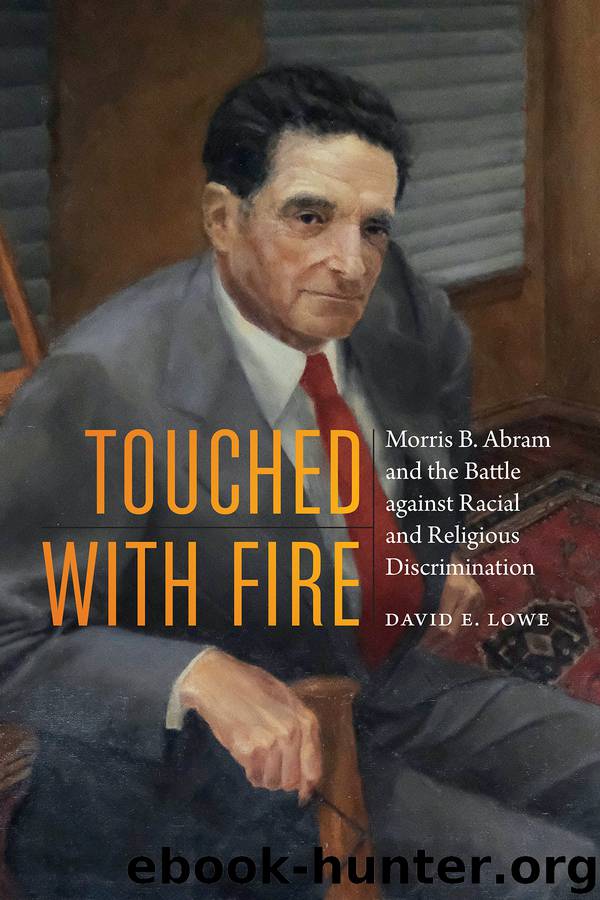Touched with Fire by David E. Lowe

Author:David E. Lowe
Language: eng
Format: epub
Tags: BIO018000 Biography & Autobiography / Religious, BIO020000 Biography & Autobiography / Lawyers & Judges, SOC031000 Social Science / Discrimination & Race Relations
Publisher: Potomac Books
Abram handled a wide range of corporate litigation for the firm, including cases dealing with antitrust, taxes, securities, and real estate. His reputation in the New York legal community was, according to Gitter, “very high. He was a very devoted lawyer to his clients, and very protective of them.” In 1977 Abram was described in New York magazine as “one of New York’s most respected lawyers.”14
Sidney Rosdeitcher, who had accompanied Abram to Americus, Georgia in 1963 as an associate at Paul, Weiss, recalled Abram’s courtroom style: “He was a very persistent cross-examiner. And he had an enormous presence in court. It was very difficult to resist his cross-examination. I’ll never forget Morris’s cross-examination of the plaintiff who had sued an insurance company he was defending. It was terrifying; I can’t tell you exactly what made it so terrifying, but it was so relentless, and he was so forceful and yet smooth. You know, he had this Southern accent which sugarcoated some of the things he was saying. But it was terribly intimidating to a witness.”15
Abram reflected on his courtroom style in his conversations with Eli Evans: “A mild man,” he said, referring to himself, “in the courtroom my adversaries think I’m a terror. There it’s a different situation. Aggression, which is the hallmark of a trial lawyer, every one of them who’s successful is a very aggressive person, but aggression in a controlled environment. Nobody’s going to hit you for what you say in a courtroom.”16
Success in the courtroom, Abram believed, required not only an instinct for the jugular but also enormous powers of concentration with respect to both the laws and the evidence. It also required an ability to improvise in situations in which a witness hesitates or offers a surprising answer. Abram told young lawyers in his firm not to follow a script or read to a witness during cross examination. Instead, he suggested, “Talk to him, watch him, see what’s making him nervous.”17 When Abram knew a witness was lying, he would pull out some papers and review them slowly to make that person think he was reading something incriminating. This technique, he said, “will turn liars into truth tellers.”18
In the fall of 1963, Abram was invited back to the University of Chicago where he had received his law degree nearly a quarter of a century earlier to deliver a lecture on the first day of class to its first year law students and the board of its alumni association. The lecture was entitled, “The Challenge of the Courtroom: Reflections on the Adversary System,” and was reproduced in the school’s publication. Abrams told the students, “The reason I choose that of the advocate in the adversarial system is the plain truth that I would find any other practice a bore.” He did not, he said, want to advise clients in the intricacies of corporate law but rather enjoyed studying legal issues at the point of controversy. “I am a generalist in the law,” he declared, “and a specialist only in procedure and drama.
Download
This site does not store any files on its server. We only index and link to content provided by other sites. Please contact the content providers to delete copyright contents if any and email us, we'll remove relevant links or contents immediately.
| General | Discrimination & Racism |
Nudge - Improving Decisions about Health, Wealth, and Happiness by Thaler Sunstein(6634)
iGen by Jean M. Twenge(4702)
The Fire Next Time by James Baldwin(4343)
Adulting by Kelly Williams Brown(3671)
The Sports Rules Book by Human Kinetics(3589)
The Hacking of the American Mind by Robert H. Lustig(3580)
The Ethical Slut by Janet W. Hardy(3504)
Captivate by Vanessa Van Edwards(3298)
Mummy Knew by Lisa James(3168)
In a Sunburned Country by Bill Bryson(2948)
Ants Among Elephants by Sujatha Gidla(2925)
The Worm at the Core by Sheldon Solomon(2918)
Suicide: A Study in Sociology by Emile Durkheim(2610)
The Slow Fix: Solve Problems, Work Smarter, and Live Better In a World Addicted to Speed by Carl Honore(2574)
Humans of New York by Brandon Stanton(2379)
Handbook of Forensic Sociology and Psychology by Stephen J. Morewitz & Mark L. Goldstein(2377)
Blackwell Companion to Sociology, The by Judith R. Blau(2319)
The Happy Hooker by Xaviera Hollander(2274)
Outliers by Malcolm Gladwell(2258)
